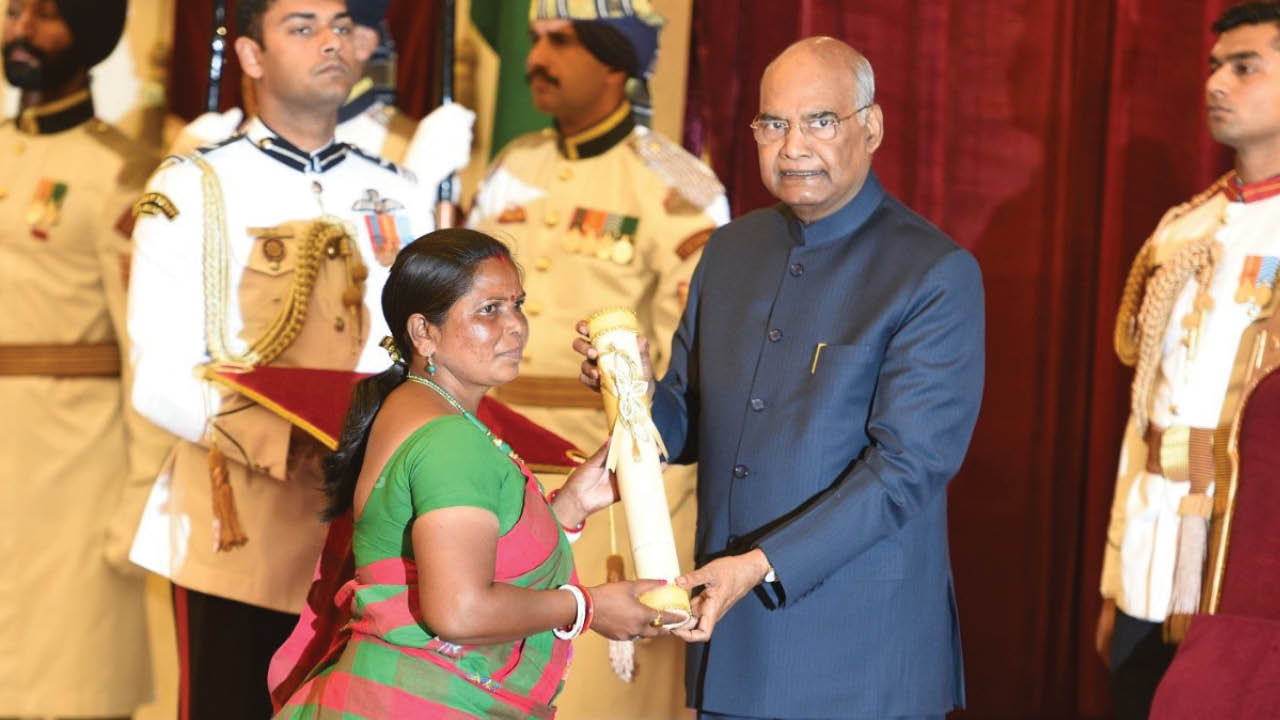Jamuna Tudu
Jamuna Tudu
Born: 1960
Muturkham, P.O. Kataboni, P.S. Chakuliya
East Singhbhum, Jharkhand
Padma Shri: 2019

About
Jamuna Tudu, an esteemed environmental activist from India, was honoured with the Padma Shri in 2019, in recognition of her relentless dedication to forest conservation and environmental protection.
Education
Specific details regarding Jamuna Tudu’s formal education are not extensively documented. However, her profound understanding of environmental issues and her leadership skills suggest a deep-rooted commitment to learning and community engagement.
Hardships Faced
Tudu’s journey in environmental activism has been fraught with significant challenges. Confronting the timber mafia and Naxalite groups in Jharkhand, she faced numerous life-threatening situations. Her family initially discouraged her endeavours, fearing for her safety. Despite these obstacles, including direct attacks on her and her husband in 2008, Tudu’s resolve to protect the forests remained unshaken.
Contributions that Brought About the Change
In 1998, upon relocating to Muturkham village in Jharkhand after her marriage, Tudu observed rampant illegal logging activities devastating the local forests. Determined to counter this destruction, she mobilised five local women to form the “Van Suraksha Samiti” (Forest Protection Committee). Armed with traditional bows and arrows, they patrolled the forests, confronting and apprehending illegal loggers.
Tudu’s strategy extended beyond confrontation. She initiated awareness campaigns within her community, emphasising the importance of forest conservation. Recognising villagers’ reliance on forest resources for fuel, she advocated for using alternative materials and sustainable practices, reducing the pressure on local woodlands.
Her leadership transformed the Van Suraksha Samiti into a formidable force, expanding to over 300 teams with at least 30 members each. This collective effort has successfully safeguarded approximately 50 hectares of forest land. The group’s vigilance includes regular patrols and community engagement, fostering a culture of environmental stewardship.
Tudu’s collaboration with governmental bodies further amplified her impact. The Jharkhand Police and Forest Department partnered with her organisation, enhancing the effectiveness of forest protection initiatives. This alliance exemplifies a successful model of community-government collaboration in environmental conservation.
Before and After
Before Tudu’s intervention, the forests surrounding Muturkham village were subjected to unchecked deforestation, leading to ecological degradation and loss of biodiversity. The timber mafia operated with impunity, exploiting the forests for commercial gain.
Tudu’s activism brought a paradigm shift. The establishment of the Van Suraksha Samiti empowered the community to take ownership of their natural resources. Illegal logging activities declined significantly, and the forests began to regenerate. The community’s perception of the forest transformed from a mere resource to a vital ecological asset worth preserving.
Achievements and Accolades
Beyond the Padma Shri, Tudu’s contributions have been widely recognised:
- Godfrey Phillips National Bravery Award (2014): This award acknowledged her courage in confronting illegal loggers and protecting the forests.
- Women Transforming India Award (2017): Presented by NITI Aayog, this accolade honoured her role in mobilising women for environmental conservation.
- Recognition by Prime Minister Narendra Modi: In his “Mann Ki Baat” programme, the Prime Minister lauded Tudu’s efforts, highlighting her success in uniting 10,000 women to protect trees and wildlife. This acknowledgment brought national attention to her cause.
Jamuna Tudu’s journey from a concerned villager to a nationally recognised environmental activist exemplifies the profound impact of grassroots movements in ecological conservation. Her story inspires and demonstrates how individual determination and community collaboration can lead to significant ecological and social transformations.

